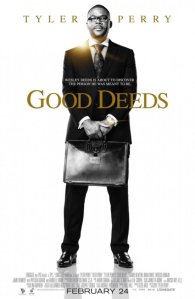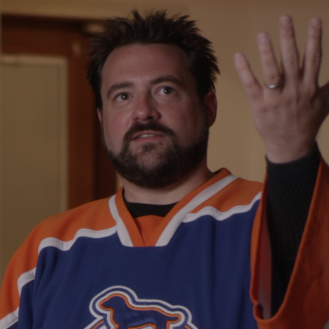By: Addison Wylie
Just when I had my mind made up. Just when I had my bags packed. Just as I was about to leave and wish filmmaker Tyler Perry good wishes. Just as I had come to terms with the realization that most of Perry’s recent work has become something that just isn’t for me, his latest film Good Deeds comes along and stops me dead in my tracks.
Perry has had a streak of bad-to-mediocre films that are either dramas, comedies, or even both; all of which he’s taken screenwriter and directorial credits for. With Good Deeds, Perry is once again penning the screenplay and sitting in the director’s chair but this time, he’s learned from past mistakes.
Part of the reason why Perry’s previous comedy Madea’s Big Happy Family was so cataclysmicly inept was because of how rushed the film felt and how it constantly yelled at us. It became what Perry’s last handful of films have been, cardboard plots told in a theatrical kind of way.
Here, Perry has pulled back on the aggressiveness in both the writing and direction (but if I had to pick one or the other, his direction has improved the most). He’s directed himself and his actors in a way that allows them to heartfeltly emote while having a sense of containment.
Perry plays the lead role, Wesley Deeds. The role isn’t necessarily a stretch for the jack-of-all-trades due to the role calling Perry to play a charismatic, successful businessman; but he does it well. Whenever Perry is on screen sans a dress, goofy speech patterns, and heavy make-up, he has this charm that radiates off of him. Even though he’s playing someone in a different class than the regular Joe Schmoe, he still comes off as “one of the guys”.
Deeds is marrying Natalie, played nicely by Gabrielle Union. Natalie is comfortable with her relationship to Wesley but finds his actions to be easily foreseen. In a number of somewhat silly scenes where Natalie is getting ready for her day, Wesley is seen behind her also getting ready. She mumbles under her breath the context of what he’s about to say and he inevitably mentions what she predicts. I can understand Wesley becoming a bit of a broken record and carrying out the same tasks day in and day out and I can even understand Natalie catching on to these hints but it takes more than a series of repetitive days for someone to face the other way and know exactly what ties this business man is deciding between. The shot of Natalie making these predictions is framed as a medium shot. Perhaps if we zoomed out, we’d see her gazing into a crystal ball.
On the other side of the see-saw, we have Lindsey, a down-on-her-luck single Mother played exceptionally by Thandie Newton. Lindsey is juggling many tasks with limited funds. These tasks include looking after her child (played by the adorable Jordenn Thompson), battling the IRS and dealing with fed up bosses and teachers, and working plenty of hours at a low pay in order to collect the rent. Lindsey has no drug problem nor any debt to any mob bosses or kingpins. She’s a person working her butt off just to have enough; because that’s all that she can afford to do.
Lindsey ends up working nights as a custodian for Wesley’s multi-million dollar company. The two end up meeting during a late shift and even though they are two very different people from two very different lifestyles, they find a friendship between them.
It’s these exchanges between Newton and Perry where the film is the strongest. Both actors work well off each other and the dialogue and the emotions feel authentic. We believe that these two could find interests in each other and maybe perhaps find love. It’s what happens when two appealing actors work together who are equally good at their craft.
However, not all the actors in Good Deeds are fortunate to have what Newton and Perry have. In fact, this is where Perry’s bad habits as a director start to seep in a bit.
There are plenty of supporting characters who are guilty of overacting. Brian White plays Wesley’s angry brother, Walter. Walter feels unappreciated and not respected. Walter also yells sexist remarks at women, instigates arguments, and is out to sabotage Wesley. So, it’s understandable as to why others don’t hold Walter in a positive light.
White chews up scenery as if he was left on an island to starve to death and just as his time on the island was about to expire, we release this ravenous person back into society. His mannerisms are always either too shifty or too spastic. His tone of voice has no such thing as a volume control. And, at times he laughs manically while in hysterics. Perry should’ve taken one look at the dailies and realized that White was acting too insane for the part.
Same advice can be given to Jamie Kennedy who plays Natalie’s gay best friend, Mark. The role of Mark is unneeded; especially when he’s given limited lines of dialogue. Natalie doesn’t even go to Mark to talk about serious things. She mainly goes to her girl friend Heidi (played by Rebecca Romijn) to vent. It’s an easy job for Kennedy though. All he has to do is blend into the background and not draw attention to himself when the main action is going on. However, all Kennedy does is pout and make sarcastic faces in the background, thus, doing the opposite of what was supposed to be a walk-in-the-park kind of job.
It hurts to state this but Cosby Show actress Phylicia Rashad belongs in the overacting camp as well. When her and Walter are bickering and taking verbal shots at each other, Rashad delivers her lines in such a dry, sinister tone, you almost expect her to start twirling an imaginary moustache. In these scenes especially, these upset people say dialogue that is absolutely unnatural. This scene unfolds in front of Wesley in a crowded restaurant and there is no way you would say the things these two say to each other in front of family and strangers. This is a situation that you would only find on a weekday, noon-time soap opera.
I also wasn’t a fan of the cinematography by Alexander Gruszynski. The establishing shots of the Atlanta cityline (standing in for a San Francisco skyline) are shot well and the movements are very smooth. However, Dr. Jekyll turns into Mr. Hyde when Gruszynski has to shoot cutaways of busy streets. Alexander obsesses over snap zooms (where the camera zooms in or out super fast) and it feels as if he’s wrestling his camera to stay mounted on the tripod. This sloppy camera work is bolded even more when Editor Maysie Hoy cuts in the middle of many snap zooms; resulting in a uneven, sometimes erratic final product.
However, with this being a Tyler Perry film where religion isn’t shoehorned into the plot and the overall message isn’t handled in a heavy handed way, this is the kind of Perry film that I accept with open arms. It’s a strong step in the right direction for the filmmaker in that he’s actually directing the majority of his actors like their in a presentation meant for a screen rather than a stage.
The film isn’t a home run because of a number of flaws here and there but if Good Deeds is a sign of Tyler Perry maturing as a filmmaker, I can accept these as minor mistakes and hope that Perry can keep on learning from them.




Leave a comment